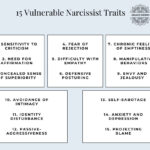Divorcing a Narcissist | How To Divorce a Narcissist
If you’re navigating the challenging journey of divorcing a narcissist, you’ve come to the right place. In this article, we will delve into the ins and outs of this complex process, providing you with invaluable insights on how to divorce a narcissist.
I’ll be sharing 15 tips and narcissist divorce tactics to help you navigate this difficult phase of your life. It’s good to acknowledge that divorcing a narcissist can be emotionally turbulent, and it’s crucial to prioritize your healing and seek guidance and support.
If you’re struggling to heal from narcissistic abuse, I warmly welcome you to my Narcissistic Abuse Recovery Program. It’s an easy self-paced online course which you can do at your own pace. My signature program combines scientific and spiritual tools for holistic healing of the body, mind, and spirit.
15 Narcissist Divorce Tactics & Tips
In this section, we dive into the essential strategies you need to know when dealing with a narcissist divorce. These narcissist divorce tactics and tips will empower you to navigate the complexities of divorcing your narcissistic husband or wife with confidence and clarity.
It’s also good to note that narcissists may be reluctant to proceed with the divorce. Click the following link to learn about the 26 psychological factors of: why a narcissist won’t divorce you.
Now let’s explore the key insights you need to learn to win a divorce with a narcissist and gain the upper hand.
1. Prioritize peaceful settlements:
Narcissists aren’t good at compromising, they always want to feel like they are winning. They can also be vindictive and may try to make your life more difficult as you go through the divorce.
If you want to win a divorce with a narcissist you have to do it peacefully through settlements agreements instead of going through bargains and compromise.
Focus on reaching settlements with the narcissistic partner during the divorce process to maintain peace and minimize unnecessary conflicts. When learning how to deal with a narcissist, prioritizing clear communication and seeking legal guidance can help navigate the complexities of divorce while protecting your own well-being.
2. Document everything:
When it comes to winning a divorce in court against a narcissist, detailed documentation is key to building a strong case. Keep a meticulous record of all conversations, emails, text messages, and incidents relevant to the divorce proceedings.
This comprehensive evidence will serve as a powerful tool in exposing the narcissist’s attempts to manipulate and distort the truth.
By presenting a clear and well-documented account of events, you increase your chances of winning a divorce in court against a narcissist and safeguarding your interests.
3. Set firm boundaries:
Establishing and enforcing boundaries is vital when getting through a divorce with a narcissist. However, direct communication with the narcissistic ex-husband or wife may only lead to further conflicts and attempts at manipulation.
Instead, consider utilizing an attorney or other professionals involved in the legal process to communicate your boundaries on your behalf. This approach not only ensures that your boundaries are clearly communicated but also adds a layer of protection and support. In addition, you’ll also be minimizing the narcissist’s opportunities to undermine or disregard your limits.
By involving a neutral party, you maintain control over the situation and prioritize your well-being throughout the divorce proceedings.
Related: Narcissist and Empath
4. Seek legal guidance early on:
Consult an experienced divorce attorney specializing in narcissism and divorcing narcissists. They will help you understand your rights, provide advice on protecting your assets, and devise effective legal strategies to counter the narcissist’s tactics.
Early legal intervention is crucial to securing a favorable outcome and safeguarding your future.
5. Practice self-care:
Divorcing a narcissist is emotionally and mentally draining. Prioritize self-care activities that rejuvenate and empower you.
Engage in regular exercise, practice mindfulness, seek therapy, and indulge in hobbies that bring you joy.
Taking care of your well-being is essential for maintaining clarity, resilience, and a positive mindset throughout the process.
Related: Setting Boundaries with a Narcissist
6. Anticipate and manage gaslighting:
Narcissists often employ gaslighting techniques to undermine your perception of reality and make you doubt yourself.
Educate yourself about narcissist gaslighting behaviors, such as denial, blame-shifting, and manipulation. By recognizing these tactics, you can protect your self-esteem, trust your instincts, and respond assertively, minimizing their impact on your mental well-being.
7. Protect your children:
Divorcing a narcissist can be messy. The last thing you want is to drag your children into a divorce from a narcissist. Therefore it’s important to protect your children from the narcissistic ex-spouse’s emotional manipulation and abuse.
Create a stable and nurturing environment for them, ensuring they understand the situation without being caught in the crossfire. If necessary, consult a child therapist to help them cope with the changes and maintain healthy emotional development.
8. Focus on facts and evidence:
When navigating a divorce with a narcissist, it’s essential to prioritize relevant information and avoid getting caught in emotional arguments. By presenting a clear, fact-based case, you counter the narcissist’s attempts to manipulate the narrative and safeguard your legal interests.
Instead of being driven by emotions, focus on logical strategies. Seek support from a professional therapist, coach, or counselor to effectively address your emotional well-being while maintaining a rational approach to dealing with a narcissistic ex-spouse in court.
9. Maintain your financial independence:
To improve your finances during a divorce with a narcissist, take proactive steps to protect your interests. Consider opening separate bank accounts, securing important documents, and seeking guidance from a financial advisor.
They can provide valuable insights on property division and spousal support matters. By maintaining financial independence, you gain stability and retain control over your future financial well-being.
Empower yourself by making informed financial decisions that align with your long-term goals.
10. Stay calm and composed:
If you want to have an amicable divorce with a narcissist, it’s essential to stay calm and composed. Emotional reactions can feed the narcissist’s desire for control and drama.
Narcissists often try to provoke emotional reactions as a means of obtaining narcissistic supply and asserting control. They may project their anger, rage, and frustration onto you, attempting to disrupt your day or plans.
By refusing to engage in their manipulative tactics and remaining emotionally grounded, you retain your power and prevent them from manipulating your emotions.
Remember, your composure is a shield against their attempts to disrupt the divorce proceedings and maintain control over your life.
11. Limit direct contact:
Minimize direct communication when divorcing a narcissistic woman or husband to reduce conflict and opportunities for manipulation. Instead, utilize written forms of communication, such as emails or text messages, which provide a record of interactions.
If necessary, engage a neutral third party, such as a mediator, to facilitate discussions and ensure a more balanced and controlled environment.
12. Focus on your future:
Divorcing a narcissist can consume your thoughts and energy. Shift your focus towards building a positive and fulfilling future for yourself. Set goals, explore new interests, and surround yourself with supportive people who uplift and inspire you.
Learn and educate yourself on self-healing from narcissistic abuse. By investing in your personal growth and happiness, you regain control over your life and break free from the narcissist’s influence.
13. Avoid engaging in their games:
Divorcing a narcissist means breaking free from their toxic web of attention-seeking, drama, and power struggles. All of these are major narcissist red flags. Refuse to be drawn into their manipulative games.
Instead, stay focused on your own well-being, personal goals, and the best interests of your children.
By detaching yourself from their toxic dynamics, you protect your emotional well-being and maintain your strength and independence.
Remember, divorcing a narcissist marks the beginning of a new chapter in your life—one that is free from their toxic drama. Embrace this opportunity to heal, create a better, healthier lifestyle, and start fresh on your journey to a brighter future.
14. Practice self-compassion:
Practicing self-compassion throughout the divorce from a narcissist is key to your healing journey and well-being.
Be kind to yourself, acknowledge your strength and resilience, and seek therapy and support to help you process the emotional aftermath of divorcing a narcissist.
Remember, healing from narcissistic abuse and rebuilding yourself are essential components of your journey toward healing and empowerment.
15. Secure a reliable support system:
Divorcing a narcissist can feel isolating and emotionally draining. Surround yourself with a strong support network comprising trusted friends, family, therapists, and support groups.
They will offer empathy, guidance, and a safe space to vent frustrations, helping you navigate the challenges with resilience and strength.
My Related Services:
–Narcissistic Abuse Recovery Program: Join a structured program that provides tools, resources, and guidance to help you navigate and heal from the impact of narcissistic abuse.
–Email Advice: Get guidance, insights, and support directly to your inbox.
FAQs
When divorcing a narcissist, consider these 15 narcissist divorce tactics and tips:
1. Prioritize peaceful settlements
2. Document everything
3. Set firm boundaries
4. Seek legal guidance early on
5. Practice self-care
6. Anticipate and manage gaslighting
7. Protect your children
8. Focus on facts and evidence
9. Maintain your financial independence
10. Stay calm and composed
11. Limit direct contact
12. Focus on your future
13. Avoid engaging in their games
14. Practice self-compassion
15. Secure a reliable support system
During divorce, a narcissist may exhibit manipulative tactics, such as gaslighting, blame-shifting, and attempts to control the narrative. They may engage in prolonged court battles, use children as leverage, or seek to undermine their ex-spouse’s credibility. Understanding these behaviors is crucial to navigate the process effectively.
Successfully divorcing a narcissist involves careful planning, setting firm boundaries, documenting everything, and seeking professional support. Focus on facts, avoid emotional engagement, and prioritize your well-being and the best interests of your children. Consult an experienced attorney to navigate the legal complexities and employ strategies that protect your rights and interests.
While every situation is unique, narcissists often have a strong desire to maintain control and may resist settling in a divorce. However, some may settle if it serves their interests or if they perceive it as a strategic move. The involvement of legal professionals, clear presentation of evidence, and negotiation skills can influence their willingness to settle.
The Bible doesn’t directly address divorcing a narcissist, as the term “narcissist” is a modern psychological concept. However, it emphasizes love, respect, and fair treatment in relationships. While the Bible discourages divorce in general (Matthew 19:6), it allows for it in cases of marital unfaithfulness (Matthew 19:9).
Additional Resources:
Narcissist Memes
Narcissistic Abuse Therapy
Narcissist Checklist
12 Traits of a Narcissist
Do Narcissists Cry?







